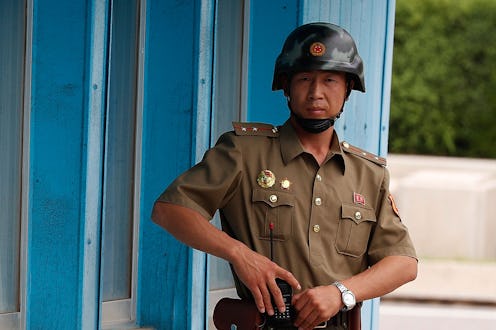News
Here's What Would Happen If North Korea Attacks The U.S.

Recently, the United States and North Korea have been engaged in what seems like an ever-escalating series of threats. In the past few months, reported intercontinental ballistic missile tests have raised the possibility of a war. This week, U.S. intelligence claimed that North Korea has managed to miniaturize nuclear warheads that could be attached to such missiles, the tensions and threats of armed conflict are rising. All of this raises a relevant question: has North Korea ever attacked the U.S.?
The answer, in simple terms, is no. While post-war North Korea has been historically very eager to lob threats in the direction of America, routinely threatening bloodshed in hyperbolic and implausible terms, it has never followed through with any of them. Not at the level of full-blown military conflict, at least, although there have been some attacks and killings of U.S. service members in isolated incidents, such as the 1976 axe attacks in the Korean demilitarized zone.
Though the fallacious intelligence regarding weapons of mass destruction that led to the Iraq war is a compelling reminder of the risks of simply assuming such assessments as fact, if recent reports about North Korea's nuclear capabilities are true, there's no doubt that the potential danger posed by a North Korean attack is far higher now than it was a decade ago.
Not because it would make any more sense to actually launch an attack. Such a move would likely be met with almost immediate and devastating retaliatory force, of the sort that could result in literally millions of deaths of North Korean civilians. However, the reality of a hostile, nuclear-armed state with the technology to target an American city is undeniably a sharper theoretical danger than one without such weapons, even with all the underlying reasons to doubt such an attack will happen remaining intact.
That's the delicate balancing act now facing any U.S. government official who wants to avoid a costly, bloody, potentially massively destabilizing war. Although the U.S. remains the only country on Earth to have ever deployed nuclear weapons on the battlefield ― against civilian centers in Hiroshima and Nagasaki, no less ― it nonetheless doesn't want to see any hostile, nuclear-armed state achieve the ability to strike against it. That ability, regardless of the likelihood of it actually happening, provides a strong pretext for neoconservatives and foreign policy hawks to push for a preemptive war.
But make no mistake, a North Korean military strike against the U.S. would be an unprecedented event, and one with existential consequences for the isolated nation — and potentially for the world.